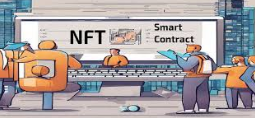Unlocking New Potential for Smart Contracts in Digital Ownership: The Hidden Power of NFTs
Smart contracts are a sea change in how digital assets are handled and maintained, especially in the context of NFTs. These self-executing contracts allow creators and owners of NFTs to introduce newer features and rules, hence opening up new avenues beyond mere ownership. As more and more digital artists and collectors enter the fold, the potential of these contracts will be all the more important to consider.
By incorporating smart contracts into NFTs, creators are able to automate royalty payments, enforce resale policies, and even design dynamic experiences that respond to interaction. Smart contracts greatly enhance the functionality of digital assets for both creators and collectors alike. Most people have only just begun to scratch the surface of what smart contracts can do in this realm.
The evolution of NFTs within smart contracts may be the very way in which ownership and engagement will be reimagined within digital worlds. As this is a space with emerging possibilities, to know how these contracts work becomes intrinsic for any person interested in the future of digital ownership.
Key Takeaways
- Smart contracts extend the functionality of NFTs.
- They automate processes such as royalty payments and resale rules.
- Understanding smart contracts is crucial for creators of digital assets and collectors.
Foundational Concepts of Smart Contracts
They are a set of agreements between two entities whereby the rules of the contract are encoded directly into lines and lines of code. Smart contracts are enabled by blockchain technology and run on it, enabling them to conduct transactions automatically. To begin understanding the role of smart contracts in NFTs, one has to seek to understand what they are.
Smart Contracts in Blockchain Technology
Mostly, smart contracts run on blockchains, mainly the Ethereum blockchain. Smart contracts apply decentralized systems in the creation of trust and transparency. Each contract is stored on the blockchain, making it tamper-proof and easily accessible.
Once the conditions of a smart contract are met, the contract executes automatically. There is reduced intermediation, hence faster transactions. The costs go lower, coupled with minimum human error.
Smart contracts are not optional in the NFT market; through them, the creators define the ownership and right to its transfer concisely. This way, terms are stated, and automatically enforced, increasing the security.
Benefits of Smart Contracts to NFTs
Smart contracts have several clear advantages to NFTs. First, they create the opportunity for automatic royalty payments to creators on the secondary sale of their work. For artists, this can mean fair compensation over time.
The second advantage of smart contracts is that they can be used to verify authenticity. It securely records information such as who has created something and when, and who it has been sold to. The tendency will be to reduce the risk of fraud in the NFT marketplace.
Third, they provide transparent and fast transactions. The buyer sees the whole history of the transaction, so he believes in it more. Such automation of processes greatly improves user experience.
In general, smart contracts completely change the principles of how NFTs work. They add so much indispensable functionality that the whole ecosystem becomes much more effective and reliable to work with.
Widening the Applications of NFT with Smart Contracts
Smart contracts can significantly increase the scope of NFTs’ capabilities. They bring automation, interactivity, and shared governance to the realm of digital assets and allow new creator and user opportunities.
Automating Royalties and Resale Rights
Smart contracts can automate royalty payments to creators of NFTs; every time an NFT gets resold, it could give a certain percentage of that sale to the original creator. That is through codes written into its smart contract.
For example, if an artist sells a pre-determined amount, say $100 for an NFT and puts a royalty of 10% in it, then by the design that artist will automatically receive $10 in future sales. This incentivizes the artists to produce more since by design, they will keep benefiting from the work.
By the same token, this kind of automation reduces friction due to intermediaries. It saves time and money in boosting profits for creators.
Enabling Dynamic Content and Interactivity
A dynamic content of NFTs allows them to evolve or be changed after the initial sale. Smart contracts do this by pointing the NFT toward external data sources. This creates interactive experiences for users.
For example, this NFT can be used as a character in some kind of game. The attributes may get better according to user achievements. This adds value and keeps engagement high.
Moreover, interactivity can build community experiences. For instance, a vote by the owners can decide changes to the NFT or to its attributes. Such engagement may create better connections between the NFT and holders.
Governance and Membership Privileges
Smart contracts can create governance systems for NFT communities. The possession of an NFT can entitle a holder to vote on project decisions or community rules. It opens up a great prospect of managing digital assets more democratically.
For example, there can be a vote by the NFT owners on which direction the project is to go in the future. Each NFT could represent one vote, and the owners would get a chance to contribute to the decisions affecting the community.
NFTs can also give access to events or content. There can be membership perks attached to certain NFTs; that adds value, and such value attracts buyers and contributors.

Also Read :